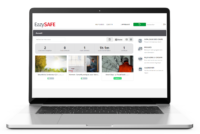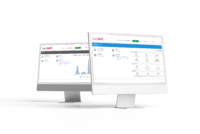Mental Health and Covid-19. What can we do?

ALAN WHITE
Wellness Consultant
EazySAFE
Without a personal frame of reference no one can say with certainty what we should or should not be doing during this crisis. The truth is that none of us have ever experienced a Global Pandemic before, and therefore we are all experiencing the effects that fear and uncertainty are having on our Mental Health.
As the realities of lockdown sink in for all of us we are coming face to face with the many frustrations that this brings with it for our personal and professional lives. Our freedom is limited, we can no longer meet our social needs, and we are worried about becoming physically sick or our loved ones becoming ill, and of course the economic implications of all of this. There are too many worries to mention, however it’s safe to say that our minds are racing with the many catastrophes that could befall us.
With so much beyond our control it’s important to first acknowledge that experiencing difficult negative feelings is perfectly normal. We are not designed to relax and become carefree during times of crises. Our body’s primal defense mechanism has evolved to prime us for fight or flight when we feel the presence of danger.
In the midst of total disruption to our lives we must put in place some new actions to counterbalance our innate negativity biases, seeing danger when it presents itself in our lives protects us, but living in that space constantly can have long lasting effects on our wellbeing. Before sharing some of the things that are helping me through this, I would first like to say that we are:
- A lot stronger than we give ourselves credit for.
- Far more resilient than we might think.
- Capable of adapting to almost any situation we find ourselves in.
I think we need to stop and remember these things regularly during this crisis and to also remember that this too shall pass. Every human experience, whether good or bad is transient and will end and this is no different. In the meantime here a few of the things I use to cope.
Fear of Uncertainty
Uncertainty creates fear, and fear can influence how we think, behave and consequently the decisions we make. When we are thinking through the lens of fear we cannot think logically or rationally. Fear triggers our fight or flight response which shuts down the prefrontal cortex in our brain which is the area that governs logic and reasoning. This is so that when we are faced with immediate physical danger we act on instinct and don’t waste time logically assessing our options.
It’s easy to see why this is important in certain situations, but counterproductive in how we need to work to find new ways of working together at the moment. As humans, we thrive on structure, routine and order in our lives. We feel at our best when we have a sense of control which a regular routine gives us. It’s important that whatever situation you find yourself in at the moment that you develop a routine to your day as quickly as possible. This is where leaders should focus their attention on supporting all staff to do this.
Regular online meetings, phone calls or emails to not only get progress reports but to ask how people are adapting and to share suggestions on how they are developing new routines. This connection with each other even remotely will give everyone a sense that they are supported and help to reduce the anxiety of uncertainty around a situation that is largely outside of our control.
Gratitude
Top of the list is Gratitude. Being thankful every day for the good things that we have in our lives. When we are feeling a lot of negative emotions we very quickly start thinking of all of the things that could go wrong and all of the things that we don’t have in our lives at that moment. Consciously recalling or better yet, writing down the things we are thankful for helps us to become more aware of the many good things in our lives. For example: I can’t see my friends and family at the moment, but I am comforted by the fact that they safe and well.
Connecting
We are social animals, we need connection with others, and this more than any other aspect of the crises could have a negative effect on our personal wellbeing. It’s easy when we are at home all of the time to fall into the trap of not making the effort to contact friends and family. Perhaps we don’t want to burden them by calling too much or we feel that there is little to talk about at the moment due to the lack of activity in our lives. However it’s important to connect daily with family, friends, colleagues and community, even if the only topic of conversation is what we plan to eat for dinner. Connection matters and will help us all get through this.
Name Difficult Feelings
Feelings, especially negative feelings, can become overwhelming very quickly if we let them. Our negative feelings tend to feed off one another and grow quickly, before long we can find ourselves in a quagmire of fear, anxiety, frustration, anger or even depression. Many of us try to bury these feelings in the hope that if we ignore them they will go away. We distract ourselves by scrolling through our newsfeeds absent mindedly, busying ourselves with mundane tasks or sometimes overusing substances such as alcohol as coping mechanisms.
Naming feelings reduces their power over us, by saying to ourselves or to someone we trust that we are feeling anxious or frustrated or we are experiencing low mood, can lessen the burden on us and also allow us to see these feeling as what they are, indicators that our needs are being frustrated. We can then identify what need is being frustrated and see if we can come up with a creative solution to meet this need. For example if we are feeling low, we might be missing someone, so we can call them.
Mind your Mind
Many of us are consumed by the latest news on Covid-19 at the moment. Regularly checking our newsfeed for the latest news and development. The majority of us have recently become engrossed in statistics and know how many cases there are in the country at any given time. Although it’s important to stay up to date on the latest developments and public health advice, it’s equally important to consume this information in a way that not overwhelming.
This means only reading about the latest developments at certain times. But also feeding your brain in other more productive ways. Read, exercise, be creative, draw, write or bake. Anything that challenges our minds in a more positive way will help us develop our capacity to get through this challenging time.
Social Media
We need to be very careful of how we use social media. It’s a great platform for staying connected with our family and friends but can lead us to compare ourselves and our current experience to that of others and almost always unfavorably. Social media is full of people telling us that we should be learning new skills, developing new business ideas, or being creative in lockdown. If that’s something you are capable of, then well done. However for most of us getting up, getting dressed and meeting the day’s obligations is a much bigger success, so be careful of falling into the comparison trap and give yourself a break.
Seek Support
This last point is perhaps the most important. If you are feeling stressed, anxious or depressed, seek support. There really are no winners and losers in this when it comes to our mental health. We are all in this together, if you are feeling overwhelmed getting the support you need as quickly as possible is very important. Whether it’s talking about it with a family member or friend or getting the help of a professional, taking care of ourselves is the most important thing we can do, for ourselves, but also the important people in our lives.

Discover our Safety Training Platform
Train your employees anytime, anywhere with our environmental, health, safety and wellness training platform.

TAILORED TRAINING
Discover our safety training courses and ehs onboardings, which can be customised and offered in several languages.

SAFETY MANAGEMENT
Ensure the distribution of your safety policy by training your permanent, temporary or seasonal staff.

GLOBAL MONITORING
Simplify the management of your safety policy thanks to the numerous dashboards and training reports.
